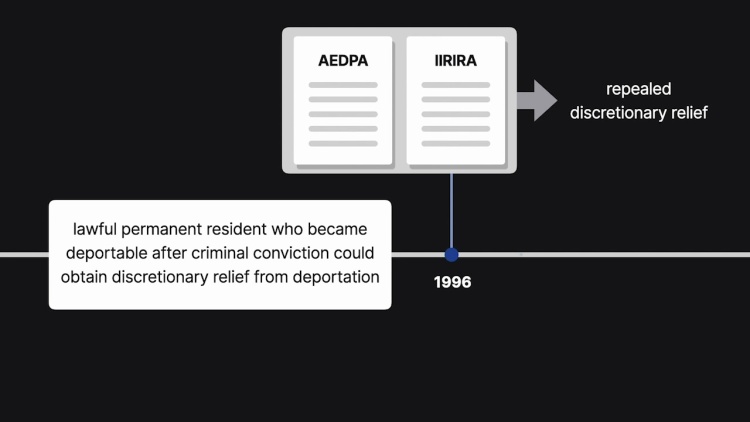INS v. St. Cyr
United States Supreme Court
533 U.S. 289 (2001)
- Written by Christopher Bova, JD
Facts
St. Cyr (plaintiff) was born in Haiti and immigrated to the United States. He became a permanent resident in 1986 but pleaded guilty to selling a controlled substance ten years later. As a result, he was found deportable and removal proceedings began in 1997. The Antiterrorism and Effective Death Penalty Act of 1996 (AEDPA) and the Illegal Immigration Reform and Immigrant Responsibility Act of 1996 (IIRIRA) became effective before his proceedings began but after he entered his guilty plea. At the time of his conviction, he was eligible for a waiver of deportation at the discretion of the Attorney General. However, the Attorney General asserted that he no longer had the discretion to grant the waiver due to AEDPA and IIRIRA. St. Cyr applied in federal district court for a writ of habeas corpus, arguing that the Attorney General misinterpreted the law, and that he is eligible for a discretionary waiver of deportation. The government argued that certain sections of AEDPA and IIRIRA removed the federal courts’ jurisdiction to rule on questions of law submitted by aliens in a habeas corpus application. The district court and the Court of Appeals held that the federal courts still have jurisdiction to hear such claims. The government appealed and the Supreme Court granted certiorari.
Rule of Law
Issue
Holding and Reasoning (Stevens, J.)
Dissent (O’Connor, J.)
Dissent (Scalia, J.)
What to do next…
Here's why 907,000 law students have relied on our case briefs:
- Written by law professors and practitioners, not other law students. 47,100 briefs, keyed to 996 casebooks. Top-notch customer support.
- The right amount of information, includes the facts, issues, rule of law, holding and reasoning, and any concurrences and dissents.
- Access in your classes, works on your mobile and tablet. Massive library of related video lessons and high quality multiple-choice questions.
- Easy to use, uniform format for every case brief. Written in plain English, not in legalese. Our briefs summarize and simplify; they don’t just repeat the court’s language.





